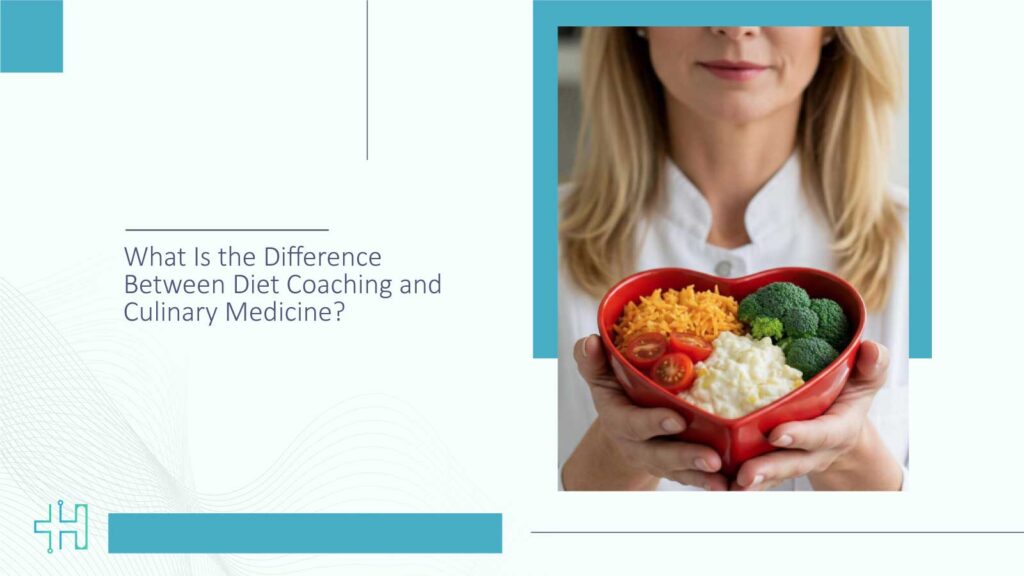Many people today are trying to eat healthier, but it can be confusing to know where to start. You may hear terms like diet coaching and culinary medicine and wonder how they differ. While both involve food and health, they are not the same. Understanding the differences can help you choose the right support based on your needs, goals, and lifestyle.
What is Diet Coaching?
Diet coaching focuses on guiding individuals toward healthier eating habits. A diet coach may be a trained nutrition professional or a certified health coach who works with clients to create personalized meal plans, set goals, track progress, and address emotional or behavioral challenges around food.
The broader global health coach market is projected to be valued at about US $20.1 billion in 2025, growing to around US $41.2 billion by 2034.
The emphasis is often on learning how to make balanced choices, portion control, reading food labels, and building routines that support long-term health. Diet coaching is largely behavior-based. It helps people develop awareness of their patterns and move toward healthier habits step by step. It is especially helpful for weight management, improving general nutrition, and gaining accountability.
What is Culinary Medicine?
Culinary medicine takes things a step further by combining nutrition science with hands-on cooking skills. It is typically led by healthcare professionals such as physicians, dietitians, or trained chefs working alongside medical teams. The goal is not only to tell patients what to eat but to show them how to prepare foods that support their health.
In the U.S., a survey found that over 4 in 5 Americans believe the healthcare system should offer more “food is medicine” programmes, and nearly 9 in 10 patients said they’d prefer healthy eating over medications for managing conditions.
Culinary medicine programs often include cooking classes, grocery store tours, and culturally relevant recipe education. This approach is used to help manage or prevent medical conditions such as diabetes, heart disease, high blood pressure, and digestive disorders. Culinary medicine turns the kitchen into part of the treatment plan.
Key Differences
The main difference lies in the level of medical involvement and skill-building. Diet coaching helps shape daily eating habits and encourages healthier choices, but it usually does not involve direct medical care.
Culinary medicine is integrated into healthcare and focuses on using food as a clinical tool. It teaches patients how to prepare meals that target specific health conditions. One is supportive guidance, while the other is a therapeutic approach connected to medical treatment.
Which One Is Right for You?
If you are looking for general guidance, motivation, or help building healthier routines, a diet coach may be the best fit. If you are managing a medical condition and want to learn how to use food to support treatment, culinary medicine may be more beneficial.
In some cases, combining both can be the most effective approach.In the end, both approaches recognize the power of food in shaping health. The difference is how that power is used and who is guiding the journey.
FAQs
1. Is culinary medicine the same as nutrition counseling?
No. Nutrition counseling focuses on what to eat based on your health needs. Culinary medicine goes further by teaching you how to cook and prepare those foods in ways that support treatment and disease prevention.
2. Do you need a medical condition to benefit from culinary medicine?
Not necessarily. While many people use culinary medicine to manage conditions like diabetes or heart disease, others join programs simply to learn healthier cooking skills and improve overall wellness.
3. Who provides diet coaching?
Diet coaching is often done by certified health coaches, nutritionists, or wellness professionals. Their role is to help you develop better eating habits and stay accountable to your goals.
4. Who provides culinary medicine?
Culinary medicine is usually offered by healthcare professionals such as physicians, registered dietitians, or trained chefs working in medical or wellness settings.
5. Can diet coaching help with weight loss?
Yes. Diet coaching can support weight loss by helping you understand portion control, food choices, emotional eating, and long-term habit building.
Dive deeper into the future of healthcare.
Keep reading on Health Technology Insights.
To participate in our interviews, please write to our HealthTech Media Room at sudipto@intentamplify.com








